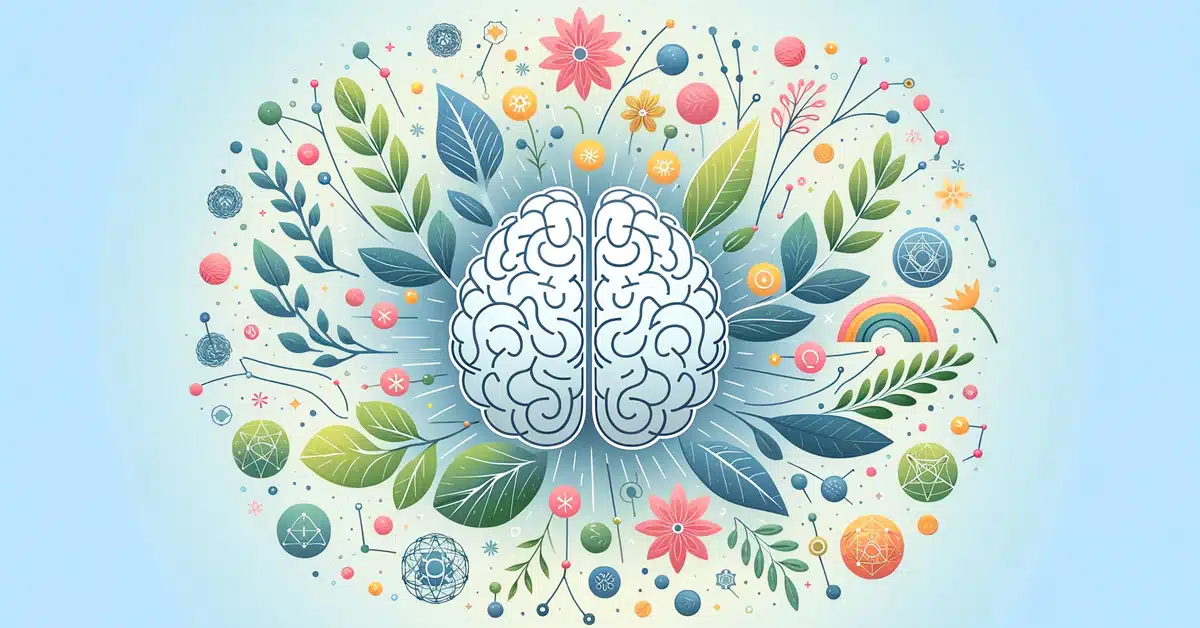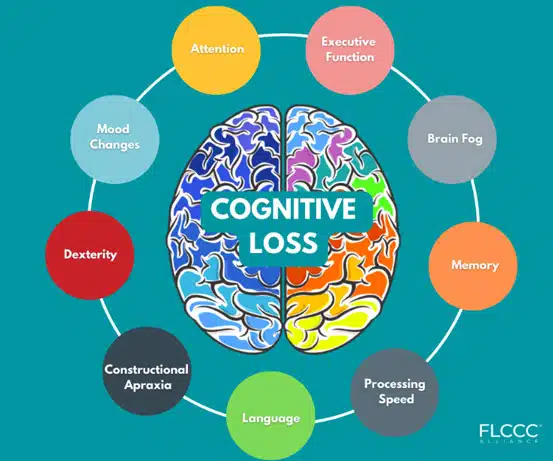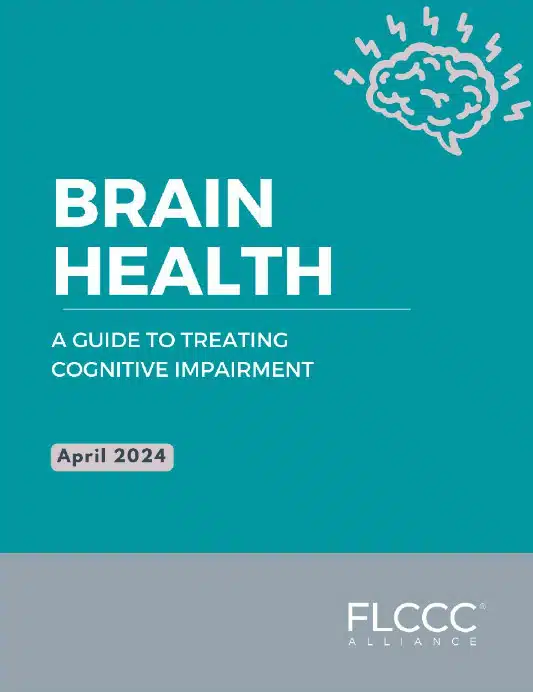Post-COVID cognitive decline is widespread. Fight back with cognitive impairment treatments like lifestyle changes & natural supplements.

If you’ve noticed an enduring change in your memory or thinking skills, you might be dealing with cognitive impairment. There are several potential causes, but in this post, we’ll focus on the new kid on the block: COVID-19.
Emerging research indicates that remnants of the spike protein (from either the virus or the injections) can damage the brain, potentially causing long-term harm.
That’s right – persistent cognitive deficits can result from a COVID-19 infection or injection.
Dr. Suzanne Gazda, a founder of the Neurology Institute of San Antonio, has observed a noticeable increase in patients with cognitive complaints since the onset of COVID. Remarkably, many of these individuals had no pre-existing cognitive issues and include young, high-performing people, not just the elderly typically associated with such problems.
This issue is particularly alarming for younger demographics, with studies revealing that between 12% and 80% of individuals may suffer from cognitive impairments. A study from the University of California, San Diego reported that nearly 69% of participants experienced memory issues six months post-diagnosis, and over 61% had concentration difficulties.
Further, data from the nonprofit React19 shows that over 70% of vaccine-injured patients endure brain fog and cognitive problems, with half still struggling a year later.
In response, Dr. Gazda has developed “Brain Health: A Guide to Treating Cognitive Impairment,” a treatment guide featured right here at the FLCCC. Special thanks to Dr. Gazda, whose insights have been invaluable in addressing these challenges.
You are welcome to read the PDF, download it, print it, and share it far and wide! Keep reading below for a summary of the major components of COVID cognitive impairment treatment. Here’s what we’ll cover:
Contents:
- What are the Impacts of Cognitive Impairment?
- Lifestyle Interventions Can Treat Cognitive Impairment
- Supplements for Long COVID Cognitive Impairment Treatment
- Other interventions to improve brain health after SARS CoV-2 Infection
1. What are the Impacts of Cognitive Impairment?
Long COVID can manifest through various symptoms that greatly affect everyday life, including one’s ability to work and perform daily activities. Recognizing these symptoms, whether caused by a COVID-19 infection or injection, is crucial for seeking proper medical advice and treatment.
Symptoms of Cognitive Impairment in Long COVID
- Fatigue: Persistent tiredness that doesn’t improve with rest.
- Headaches: Frequent or chronic headaches that may not respond well to typical pain relief methods.
- Brain Fog: Difficulty with focus, memory, and clarity of thought.
- Visuo-Spatial Difficulties: Challenges with understanding spatial relationships and handling three-dimensional objects, which can affect tasks like driving.
- Constructional Apraxia: The inability to build, assemble, or draw objects, impacting daily tasks and professional activities.
- Psychomotor Slowing: Noted in a January 2024 study from The Lancet, this includes slower reaction times and decreased alertness.
Patients experiencing these symptoms should consult a healthcare provider for a thorough evaluation, as highlighted in the study by Golderisi et al., which found that 45% of patients 11 months post-COVID had measurable cognitive impairments.

2. Lifestyle Interventions Can Treat Cognitive Impairment
Lifestyle interventions can have a significant impact on cognitive symptoms. These interventions are not just for long haulers (long COVID patients), but anybody who is experiencing cognitive difficulties.
By adjusting various aspects of daily living, such as diet, fasting habits, gut health, physical activity, and sleep routines, individuals can actively contribute to better brain health. Below are key interventions:
- Dietary Changes
- Intermittent Fasting
- Optimize Gut Health
- Exercise
- Sleep
- Address Hearing Loss
- Early Morning Light
- Stress Reduction
- Social Connections
Dietary Changes
A 2022 study linked high consumption of ultra-processed foods to increased dementia risks, including Alzheimer’s. These foods, often high in sugars, fats, and salts but low in essential nutrients, correspond to a 25% increased risk for dementia for every 10% increase in consumption. Opting for a diet rich in whole foods and possibly gluten-free can reduce inflammation and improve brain health.
👉 Learn more: FLCCC Eat Well Guide
Intermittent Fasting
Fasting has proven benefits for the brain, such as enhancing brain-derived neurotrophic factor (BDNF), reducing inflammation, and promoting cellular cleanup through autophagy. However, fasting should be approached cautiously, especially by those under 18, pregnant women, and individuals with health conditions like diabetes.
👉 Learn more: FLCCC Guide to Intermittent Fasting
Optimize Gut Healing
The gut-brain axis plays a crucial role in mental and neurological health through its complex neural, hormonal, immune, and metabolic pathways. Achieving a balanced gut microbiota is essential for reducing inflammation, supporting immune function, and producing neurotransmitters like serotonin.
👉 Learn more: COVID-19 and Gut Health
Exercise
Regular exercise boosts brain health by increasing BDNF, enhancing neurotransmission, and supporting immune response. Activities like walking, strength training, and yoga not only improve physical health but also cognitive functions by reducing inflammation and promoting neural growth.
Sleep
Quality sleep is vital for brain health, facilitating the removal of toxins and reducing the risk of neurodegenerative diseases. Strategies for better sleep include maintaining a regular sleep schedule, creating a restful environment, and avoiding stimulants close to bedtime.
3. Supplements for Long COVID Cognitive Impairment Treatment
In today’s world, you cannot afford limitations to your executive functioning.
In addressing cognitive decline and enhancing brain health, several key supplements have emerged as beneficial. Incorporating these into a daily routine can support overall cognitive functions and mitigate neurological diseases.
Many of these supplements have near zero side effects, and will have the added bonus of helping to ward off infectious disease. That’s in addition to the potential for helping COVID brain fog, and other neurological symptoms that arise after developing long COVID.
Key Supplements for Brain Health:
- Multivitamins
- B vitamins
- Resveratrol
- Omega-3 fatty acids
- Methylene Blue
- Melatonin
- Berberine
- Green Tea/EGCG
- Luteolin
- N-acetyl cysteine (NAC)
- CDP Choline
- Fisetin
- Nicotinamide adenine dinucleotide (NAD)
- Vitamin D
- Taurine
- Magnesium Threonate
- Acetyl-L-carnitine (ALCAR)
- Low dose Naltrexone (LDN)
- Ashwagandha
- Lion’s Mane
- Lithium Orotate
Multivitamins
Due to the decline in nutrient content in modern diets, a daily multivitamin is essential for providing the micronutrients needed for optimal brain function. Research has shown that multivitamins can significantly reduce memory loss and cognitive aging.
B Vitamins
The family of B vitamins plays crucial roles in brain health, influencing energy production and reducing oxidative stress. These vitamins are particularly effective in managing neurological conditions like Parkinson’s disease and migraine headaches.
Resveratrol
This potent antioxidant boosts cerebral blood flow and enhances brain health by protecting against neurological damage and improving vascular functions.
Omega-3 Fatty Acids
Essential for neuronal health, omega-3 fatty acids enhance brain function and protect against neurodegeneration. They are critical in maintaining cellular health and supporting the glymphatic system.
Methylene Blue
Methylene Blue supports brain health by reducing neuroinflammation and enhancing mitochondrial function. It plays a role in removing toxic proteins from brain cells.
Melatonin
Known for its antioxidant and anti-inflammatory properties, melatonin supports brain health by regulating stress hormones and promoting neuronal growth.
Berberine
Berberine boosts levels of various neurotransmitters and plays a significant role in preventing Alzheimer’s disease by modulating key enzymes.
Green Tea/EGCG
EGCG from green tea helps prevent protein aggregation linked to several neurodegenerative diseases, showcasing strong neuroprotective properties.
Luteolin
This flavonoid possesses powerful antioxidant and anti-inflammatory benefits, contributing to its protective effects on the brain.
N-acetyl cysteine (NAC)
NAC boosts glutathione levels, a critical antioxidant in the brain, helping to maintain cognitive functions and protect against neurodegenerative diseases.
CDP Choline
CDP choline enhances neurotransmitter release and supports brain energy metabolism, improving cognitive functions and memory.
Fisetin
Fisetin supports brain health by promoting autophagy and protecting against neurodegenerative diseases through its anti-aging effects.
Nicotinamide adenine dinucleotide (NAD)
NAD is vital for energy transfer in the brain, and its depletion is linked to age-related cognitive decline.
Vitamin D
Vitamin D is crucial for maintaining brain structure and function, with deficiencies linked to increased risks of dementia.
Taurine
Taurine supports mitochondrial function and has been shown to improve cognitive functions and overall brain health.
Magnesium Threonate
Magnesium is essential for brain function and helps protect against cognitive decline by supporting neurotransmitter activities and energy production.
Acetyl-L-carnitine (ALCAR)
ALCAR enhances cognitive function and supports neuronal health through its effects on metabolism and neurotransmitter activity.
Low dose Naltrexone (LDN)
LDN offers unique immunomodulatory benefits, reducing inflammation and supporting brain health at low doses.
Ashwagandha
Ashwagandha enhances brain function by boosting neurotransmitter activity and reducing stress responses.
Lion’s Mane
This medicinal mushroom supports brain health by stimulating nerve growth factors and offering neuroprotective benefits.
Lithium Orotate
Lithium Orotate provides neuroprotective effects and supports cognitive functions, particularly beneficial in managing conditions like bipolar disorder and reducing age-related cognitive decline.
👇 Watch Now: Dr. Suzanne Gazda speaks about emerging neurological disorders at FLCCC’s Winter 2024 Educational Conference
4. Other interventions to improve brain health after SARS CoV-2 Infection
Other interventions can significantly enhance brain health beyond traditional medical treatments. These methods focus on improving vascular health, stimulating the vagal nerve, encouraging neuroplasticity, fostering mindfulness, integrating breath work, exploring photobiomodulation, and optimizing nutrition.
Key Interventions to Improve Brain Health:
- Address Vascular Issues
- Retrain or Stimulate Vagal Nerve
- Neuroplasticity Training
- Mindfulness and Meditation
- Breath Work
- Photobiomodulation
- Nutrition
Address Vascular Issues
Focus on improving cerebral blood flow and addressing micro-clotting issues related to long COVID and post-vaccine injuries as outlined in the FLCCC I-RECOVER guide.
Retrain or Stimulate Vagal Nerve
Stimulating the vagal nerve can reduce inflammation, protect the brain, and help maintain blood-brain barrier integrity. Techniques include mindfulness, grounding, breath work, and cold-water immersion.
Neuroplasticity Training
Engaging in activities that foster neuroplasticity helps reshape the brain’s neural connections. These include physical exercise, engaging in new learning activities, and practices like handwriting, which activates multiple brain regions.
Mindfulness and Meditation
These practices help focus attention on the present, reducing stress and its negative effects on the brain. Regular mindfulness and meditation are linked to lower levels of harmful brain proteins and can potentially reverse brain aging.
Breath Work
Controlled breathing exercises improve cognitive function by lowering stress hormones and enhancing mood and attention. Practices such as diaphragmatic breathing are particularly effective.
Photobiomodulation
This light therapy stimulates brain function and has been shown to enhance cognitive abilities, reduce inflammation, and assist in clearing amyloid plaques in Alzheimer’s disease.
Nutrition
A balanced diet rich in whole foods, fibers, lean proteins, and healthy fats supports the gut-brain axis and overall brain health. Avoiding processed foods and sugars is crucial for maintaining optimal cognitive function.
These interventions collectively form a comprehensive strategy to combat cognitive decline and enhance brain health through lifestyle and therapeutic practices.
Wrapping up
In conclusion, improving brain health means adopting a range of strategies beyond just medicine. Simple changes in lifestyle, diet, and engaging in activities like mindfulness and vagal nerve exercises can make a big difference. These methods help reduce inflammation, boost brain connections, and enhance overall well-being.
As we learn more, these approaches offer real hope for those looking to boost their brain function and combat cognitive decline. By incorporating these practices into daily life, we can take significant strides toward better brain health and a fuller, more vibrant life.
Check out these posts and webinars more of Dr. Gazda’s outstanding work:





